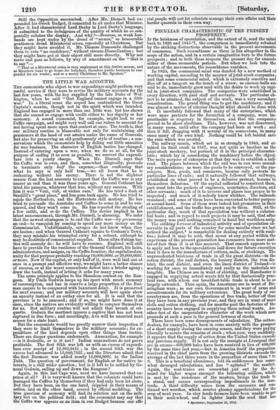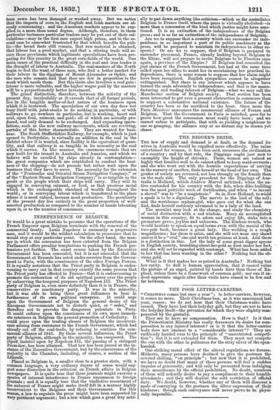PECULIAR CHARACTERISTIC OF THE PRESENT PROSPR1ITTY.
IF the briskness of speculation, and the extent of it, send the mind back to 1825 and 1845-'7, the comparison is immediately rebuked by the striking distinctions observable in the present movements of commerce. Such resemblance as there is lies altogether in the scope of the action, and in a certain imaginative turn to the future prospects ; and in both these respects the present day far exceeds either of those memorable periods. But when we look into the nature of the movements, the resemblance vanishes.
In 1825, the commercial mind was dazzled by a new method of working capital, according to the manner of joint-stock companies; and that same commercial mind, which is extremely sensitive and flies off at a tangent on the touch of a straw, as cannon-balls are said to do, immediately grew mad with the desire to work up capi- tal in joint-stock companies. The companies were established in every direction, with paid staff and servants. The particular ob- ject to be attained, the subject of the work, was a very secondary consideration. The grand thing was to get the machinery, and it was almost a matter of ulterior thought what should be done with it. It inevitably followed that many of the enterprises, which were mere pretexts for the formation of a company, were im- practicable or nugatory in themselves, and that the companies proved to be sheer abortions. This, however, was not discovered, in many, cases, until after the company had been at work ; and then it fell, dragging with it several of its connexions, in many cases many of its own kind. Nothing could be left behind save the ruin which was created.
The railway mania, which set in so strongly in 1845, and at- tained its final crash in 1847, was not quite so baseless as the joint-stock mockery, but partook of it in the principal character- istic; which lay in considering the machinery before the object. The main purpose of enterprise at that day was to establish a rail- road. The places between which the rail was to run were second- ary considerations; so were the goods to be conveyed, or the pas- sengers. Men, goods, and commerce, became only pretexts for particular lines of rails ; and it naturally followed that railways, established on what proved to be a delusive pretext, became in themselves delusions. Of the capital collected to construct them, part went into the pockets of engineers, secretaries, directors, and other servants ; much of it to taverns and places less proper to be inspected; and much of it nobody knew whither. The railroads remained; and some of them have been converted to better purpose at• second-hand. Some of them were indeed but premature in their establishment, and the traffic has grown up to them. Still, at the particular day, much of that speculation was without a substan- tial basis ; and in regard to such projects it may be said, that after the money was paid nothing remained in hand but worthless scrip.
The striking fervour of industrial activity and of speculation ob- servable in all parts of the country for some months since we last noticed the subject,* is remarkable for dealing entirely with reali- ties; indeed it may be said, that never at any period within the experience of the present generation has commerce been more mat- ter-of-fact than it is at this moment. That remark appears to us to apply not less to the speculations laid down for future execution than it does to the manufacture of cottons, nails, or stockings. The unprecedented briskness of trade in all the great districts—in the cotton district, the nail district, the hosiery district, the iron dis- trict, the coal district, and even the linen district of Ireland—is working for once as immediately and really as the materials are tangible. The Chinese are in want of shirting, and Manchester is engaged in supplying actual wants felt by that fantastically prac- tical race, with whom our breakfast-table trade is about to be so largely extended. Thus again, the Americans are in want of Bir- mingham ware ; as our own Government is in want of arms and accoutrements for its military extensions. The great body of our countrymen are, from the operations of free trade, better off than they have been in any previous year, and they are in want of more cloth and cotton clothing, and for months past the factories of the country have been engaged in supplying those actual wants. An- other test of the unspeculative character of the work which now proceeds at such a pace is the general lowness of stocks. There have been some derangements of calculation. The cotton- dealers, for example, have been in some anxiety with the prospect of a short supply during the ensuing season, and they were paying liberally to secure the remains of stock ; when now, very suddenly, it appears that the supply of cotton from the United States exceeds any previous supply. It is not only the receipts at Liverpool that are in excess-600,000 bales have been received in lieu of 400,000 by the same time last year,—but in America itself the proportion received in the chief ports from the growing districts exceeds the average of the last three years in the proportion of more than 7 to 6. This is a beneficial abundance, but its suddenness has some- what deranged calculations, and has " agitated" the market. Again, the coal-trades are somewhat put out by the de- mand for higher wages amongst the labouring colliers, which is met by the resistance of ,the masters, brings the trade to a stand, and causes corresponding impediments in the iron- trade. A third difficulty arises from the excessive and con- tinued wet weather, which creates gloomy apprehensions for the crop of next year. In clay lands farmers have been unable to get in their seed-wheat, and in lighter lands the seed that has
• Spectator, September 25, 1852.
been sown has been damaged or washed away. But we notice that the imports of corn in the English and Irish markets are al- ready commencing ; and the American markets appear to be sup- plied in a more than usual degree. Although, therefore, in these particular instances particular traders may be put out of their cal- culations—may in the first case expect high prices, and in the se- cond case be somewhat frustrated by that which benefits the pub- lic—the broad facts still remain, that raw material is obtained, that labour has a good market, and that a stirring trade will se- cure those provisions which legitimate speculations have been pre- paring for this country in the great corn-fields of the world. One main cause of the practical difficulty in the coal and iron trades is the draught of labour to Australia. The coal-masters of the North begin to feel the want of those men, who find a better market for their labour in the diggings of Mount Alexander or Ophir, and the men who remain find that they are few in proportion to the work which needs them. But this claim also involves a real gain: labour is more valuable, and the higher wages paid by the masters will be a proportionately better investment.
The grand distinction, therefore, between the activity of the present day, incalculably as it exceeds that of all former periods, lies in the tangible matter-of-fact nature of the business upon which it is bestowed. The speculation of our own day does not busy itself with joint-stocks to do nothing in particular, or with railways to go nowhere inparticular, but is working, heart and soul, upon food, raiment, and gold; all of which are actually pro- duced, and only demand to be exchanged. And expanding specu- lations, such as the new railway movements, which are reviving, partake of this better characteristic. They are wanted for busi- ness. The South Staffordshire Railway, for example, which is just opened to Derbyshire, is virtually an addition to the coal in the district where it is wanted, since facility is the equivalent of quan- tity, and that railway is as tangible in its necessity as the coal which it carries. In like manner, the enormous vessels that are now built for the transit to Australia and America, and which we believe will be excelled by ships already in contemplation— the great companies which are established to conduct the busi- ness of the shipping—do not precede but rather wait upon the business that they have to serve. The necessity for the extension of the "Peninsular and Oriental Steam Navigation Company," or of the "Eastern Steam Navigation Company," is as tangible as the goods or the people which their ships will carry. They will be engaged in conveying raiment, or food, or that precious metal which is the exchangeable standard of wealth throughout the world; or in conveying labour which is transferred to the place where it is most valued, because most productive. The peculiarity of the present day lies entirely in the great proportion of well- assorted production as compared to the number of hands labouring upon it, or to the number of consumers.



































 Previous page
Previous page